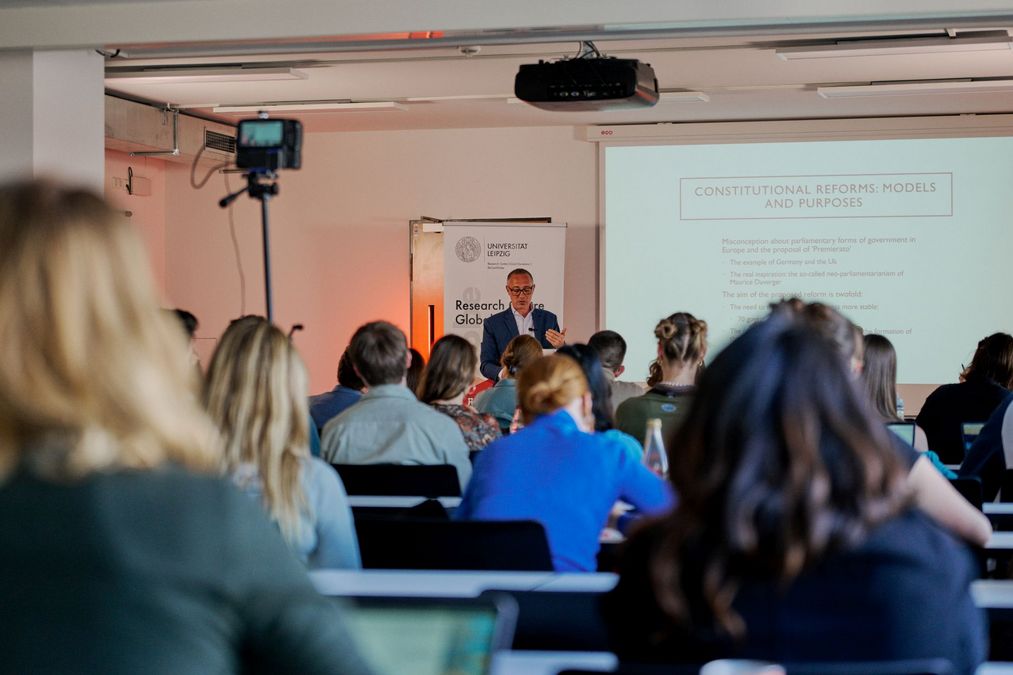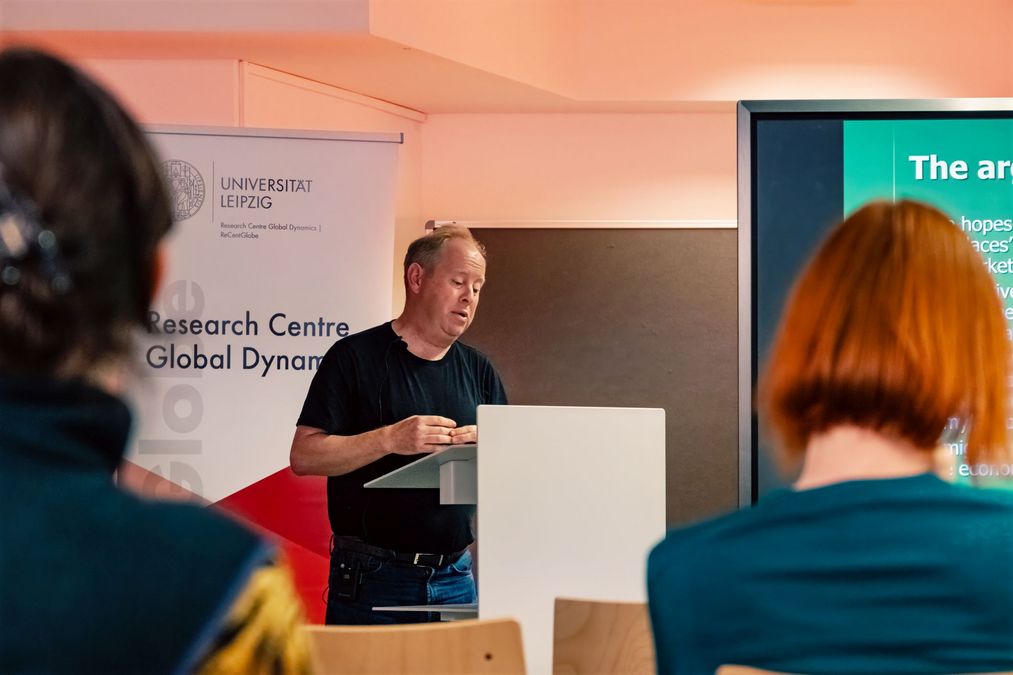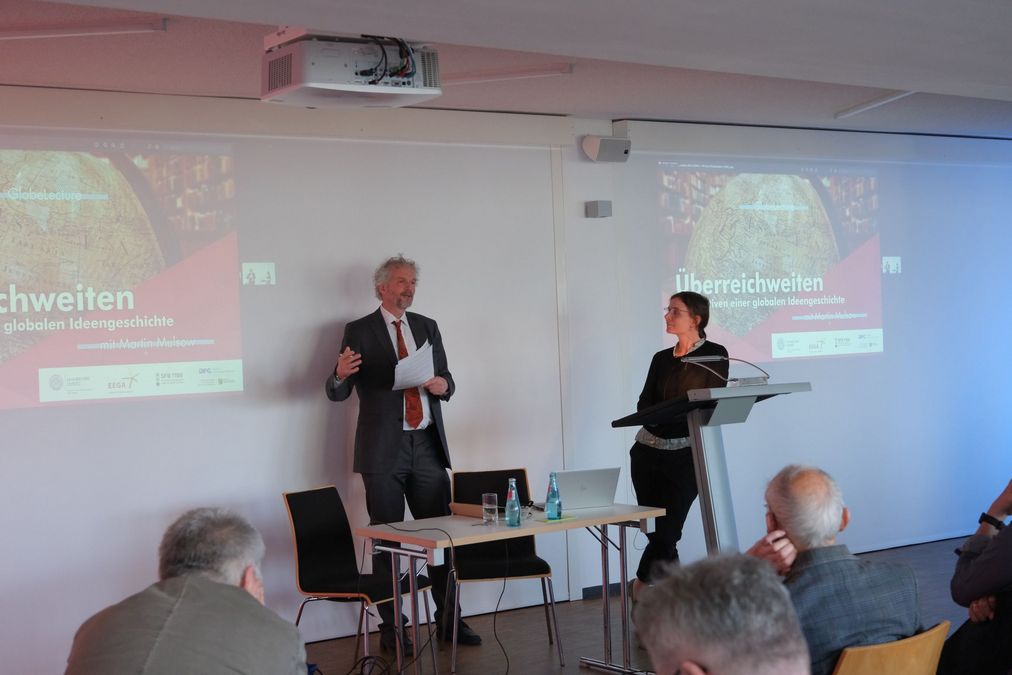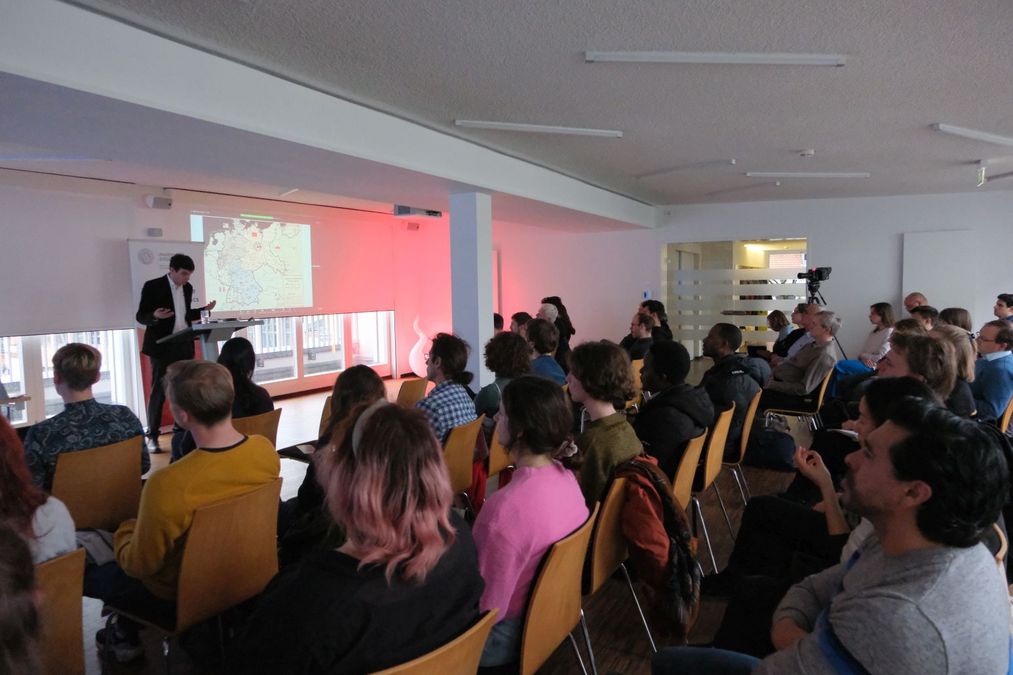Die GlobeLecture ist eine mehrmals im Semester stattfindende Vortragsreihe, in der herausragende Wissenschaftler:innen über globalen Wandel, transnationale Verflechtungen und regionale Transformationen referieren. Sie wird vom ReCentGlobe in Kooperation mit Partnern innerhalb und außerhalb der Universität Leipzig organisiert.
Vergangene GlobeLectures
GlobeLecture #9: Implementing the Women, Peace and Security Agenda in Africa: The Need for a Reset
mit Cheryl Hendricks (Cape Town)
Einführung & Moderation: Ulf Engel (Leipzig)
The need to reset Peace and Security approaches globally, and in Africa, is widely articulated and finds expression in the UN’s New Agenda for Peace and its Pact for the Future. It has also been central to the deliberations of the past two Retreats of Special Representatives, Envoys and Ambassadors of the African Union on Peace, Security and Stability in Africa. Although Women Peace and Security (WPS) is seen as a key part of the new approaches to peace and security, the ways in which it has been discussed and included is rather limiting. Reference is usually made to ensuring the acceleration of its implementation with little critical reflection of the strengths and limitations of its conceptualisation, strategies, and/or its overall relationship to the main peace and security agenda. This discussion will therefore provide an overview of the evolution of the WPS agenda, especially in Africa, and highlight its strengths and challenges, as well as make the case for a reset of the agenda in relation to the shifting peace and security contexts.
Professor Cheryl Hendricks is the Executive Director of the Institute for Justice and Reconciliation and currently fellow with the Research Centre Global Dynamic's ANCIP-Project. Prior to this, she was the Executive Director of the Africa Institute of South Africa (AISA), within the Human Sciences Research Council (HSRC). She was also a Professor and Head of Department of Politics and International Studies at the University of Johannesburg (UJ) South Africa, from April 2013 to June 2018. She also previously worked at the Institute for Security Studies first as program head for the Southern Africa Human Security Programme and then as senior research fellow in the Conflict Management and Peacebuilding Division. She holds a PhD in Government and International Relations from the University of South Carolina and a Masters in Southern African studies from the University of York, England. Her substantive knowledge areas include conflict management (conflict prevention, peace-making, peacekeeping and peacebuilding); women, peace and security; African Politics, South African Foreign Policy, Regional Security Architectures. She has published widely on these topics and engages a range of policymakers, academics, researchers and civil society on these issues.
GlobeLecture #8: "Figuring Out the Past" – Do numbers tell stories?
Silke Schwandt (Bielefeld)
Einleitung & Moderation: Manuel Burghardt (Leipzig)
Numbers and statistical evidence in general are often associated with a particularly high truth value. Once you can put a number to an argument, it is easier to convince someone or find a willing audience. But what if numbers and quantitative methods are applied in the humanities? Can you tell stories with numbers? The power of persuasion for stories lies in their plausibility rather than in mere numbers. Still, in the field of digital humanities or digital history, quantification is used more often today and brings us back to exactly that question: do numbers tell stories? Can we quantify narratives?
The talk will address these questions using examples from Digital History as a field of study with a particular focus on medieval history.
Silke Schwandt is Professor for Digital History at the Faculty for History, Philosophy and Theology at Bielefeld University and Founding Director of the Center for Uncertainty Studies. In her research and teaching activities Silke Schwandt addresses challenges of research and digitality on three levels: in the theorisation of digital history, in its methods and practices, as well as in its dissemination in academic teaching and to society.
GlobeLecture #7: Constitutional Reform and Right-Wing Populism in Italy
Mit Lorenzo Spadacini (Brescia)
Einleitung & Moderation: Fabian Michl (Leipzig)
The current populist right-wing government in Italy is pushing for a constitutional reform aimed at introducing direct popular election of the prime minister, aligning the majority of MPs with the executive branch. Despite this proposal being in line with current populist tendencies, Lorenzo Spadacini’s lecture will illustrate that it is rooted in much older constitutional schemes. The Acerbo Law of 1923, promoted by Mussolini, followed a similar pattern, and comparable schemes have been reiterated over time, even during the republican period, as can be seen in the so-called Fraud Law of 1953, the law for municipalities of 1993, and the constitutional law for regions of 1999. Moreover, reform proposals similar to those advocated by the political right nowadays have been supported in the past by the centre and the left. In essence, the constitutional populism currently expressed by the right is more widely spread in Italian political culture and persists over time, arguably due to the weak liberal tradition of the country’s political system.
Prof. Lorenzo Spadacini is an esteemed Associate Professor at the University of Brescia, specializing in Italian and European constitutional law. He holds a PhD from the University of Verona and a Law degree from the University of Brescia. Prof. Spadacini has served as a Visiting Scholar at Cornell University Law School and held the position of Head of the Department for Institutional Reforms at the Office of the Prime Minister of Italy. His research focuses on democratic representation, electoral systems, and regional autonomy. Notable works include the monograph Decreto-legge e alterazione del quadro costituzionale (2022).
The event is organized in cooperation with the Dr. Fabian Michl, Assistant Professor for Public Law and the Law of Politics at the Faculty of Law.
GlobeLecture #6: Diverse economies of ‘left behind places’?
05.02.2024
Peter North (University of Liverpool) Concerns about the rise of right wing forms of populism across Europe (consider Brexit, Law and Justice in Poland, AfD in Germany) have led to concerns that neoliberal business-as-usual has failed to meet the needs of those who feel ‘left behind’, or at least disrespected, by those with a liberal commitment to globalisation and open economies. Liberalism is the ‘light that has failed’. Yet 34 years after the fall of what was called ‘actually-existing socialism’, and despite the brief upwelling of alternatives associated the democratic movements of 1989 in places like Leipzig, there seems to be no convincing counter narrative. Geographers associated with the ‘diverse economies’ school first advanced by JK Gibson-Graham, and advocates of social and solidarity economies, have posited a more hopeful stance which focusses on developing ways that we can live well, in place, in the Anthropocene. Yet for critics, this social economy has been progressively neoliberalised (in the UK) while for others it falls into a space that looks too much like a discredited socialism – perhaps being neither state nor market, the worst of both worlds. In this talk I will discuss my work on social and solidarity economies in the UK and East and Central Europe and invite discussion about a more hopeful politics for places feeling that they have still been ‘left behind’ which perhaps owes more to diverse and alternative conceptions of entrepreneurialism than either free markets of state socialism.
Organized with Thilo Lang, Oliver Sattler and the Leibniz Institute for Regional Geography
GlobeLecture #5: Extremism and Youth Radicalization - Strategies for Prevention and Disengagement
03.11.2023
Dr. Cynthia Miller-Idriss (American University, Washington, DC) This lecture discusses changes in the U.S. national strategy to prevent and counter extremist violence, including an embrace of public health style approaches to prevention. Dr. Miller-Idriss also reviews recent trends in U.S. political and hate-fueled violence and shares an emerging evidence base about the effectiveness of two core interventions: short form “prebunking” videos and community-based capacity building with parents, caregivers, youth mentors, faith leaders, mental health professionals, and educators. She also highlights key areas of transatlantic dialogue and cooperation about promising practices in each country.
Organized with Oliver Decker and the Else-Frenkel-Brunswik-Institute for Democracy in Saxony
GlobeLecture #4: Left Behind Places, Populism and Discontent in an Increasingly Uneven World
11.09.2023
Danny MacKinnon (Newcastle University) Renewed political concern about geographical inequalities in the wake of the global financial crisis of 2008 is raising questions about the ability of the prevalent pre-crisis model of development to generate more spatially balanced and inclusive economic development. This lecture provides the first assessment of this emergent post-2008 spatial policy in relation to the interaction of three key processes: neoliberalism; the rise of state capitalism; and, populism and the geography of discontent. Danny MacKinnon discusses how the interactions between these three factors have shaped spatial policy in Europe and North America since 2008. This is based on three main forms of spatial policy: metropolitanisation strategies to support the growth of large city-regions; the extension of competitiveness policies to smaller cities and towns; and, place-based industrial policies. MacKinnon argues that while these new spatial and industrial policies are focusing attention on ‘left behind places’ and rejecting elements of globalism and neoliberalism, they have not as yet dislodged the underlying emphasis on growth and competitiveness.
Organized with Thilo Lang and the Leibnitz Institute for Regional Geography
GlobeLecture #3: Are We All In This Together? Colonialism, Environmental History and the Anthropocene in South Asia
13.07.2023
Dr. Rohan D'Souza (Kyoto University) The lecture critically explores the intersecting dimensions of colonial legacy, environmental history, and Anthropocene politics in the context of South Asia. It examines the conception of the 'differentiated human,' a topic rooted deeply in the colonial experiences of the region. Challenging conventional narratives, Rohan D'Souza posits that the discourse around Anthropocene politics should pivot towards the pressing urgency of global survival rather than being limited to the narratives of economic and social justice. Yet, he also raises the provocative question: are these goals of planetary survival and justice truly irreconcilable, or are they occurring on distinct, yet interconnected, scales?
Organized with Nina Mackert and the "Leipzig Lab - Global Health"
GlobeLecture #2: Überreichweiten. Perspektiven einer globalen Ideengeschichte
17.05.2023
Prof. Dr. Martin Mulsow (Universität Erfurt) In seinem Buch deutet Martin Mulsow die Frühe Neuzeit als eine Zeit der Überreichweiten, als eine Epoche, in der Quellen und Nachrichten aus nah und fern sich überlagerten, ohne dass man mit dieser Verdoppelung zurechtkam oder sie manchmal auch nur bemerkte.
Organisiert in Kooperation mit Julia Schmidt-Funke und dem Historischen Seminar der Universität Leipzig
GlobeLecture #1: Divided Nation, New States. The Cold War Battle for Legitimacy in Divided Countries in Europe and Asia, 1945–89
12.04.2023
Dr. Sebastian Gehrig (University of Roehampton, London) The first GlobeLecture explored the rise of new international conflicts over “divided nations” during the Cold War. In an era otherwise marked by colonial “partitions” at the end of empire, the ideological stand-off between the superpowers and their allies catapulted the issue of national division to the centre of international politics. Especially at the United Nations, this new problem connected European and Asian Cold War politics and the fate of Germany, China, Korea, and Vietnam directly. This lecture analyzed the impact of the global Cold War on the Federal Republic of Germany and the German Democratic Republic and traced the importance of conflicts over divided nations in Asia for both German governments and ordinary Germans alike.
Organized with Fabian Michl and the Faculty of Law as well as the SFB 1199 “Processes of Spatialization under the Global Condition”











